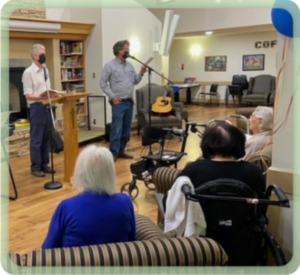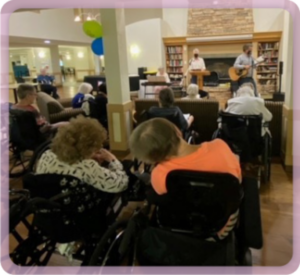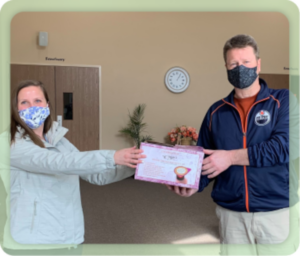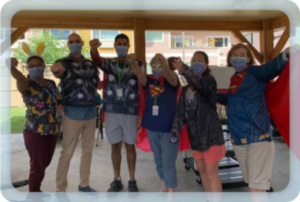by Sarah Rudd, Manager of Mission Engagement and Chaplaincy


Chaplaincy at the Good Samaritan Society looks quite a bit different today than it did originally. In the beginning, our chaplains were effectively “pastors in residence,” responsible only for looking after residents’ religious needs. While our organization’s history is full of leaders who went above and beyond to provide the care our residents need, the core purpose of the chaplain was to serve as an extension of the Church in a clinical care setting.
As the world around us has evolved, so have the religious and spiritual needs of our residents. To help meet these needs, the role of chaplaincy at Good Samaritan has evolved as well. Today’s chaplains are clinically-trained professionals with religious, philosophical, and social science backgrounds. They provide support, encouragement, guidance, and a host of other services to residents and staff alike. As part of the Mission Engagement team, chaplains serve on annual initiatives, committees, working groups and projects, as well as engaging community members and partners on behalf of your community.
Pastoral Care
Pastoral care and programing is only one of the chaplain’s responsibilities, but it is still absolutely essential to fulfilling our mission and caring for our residents.
Services that chaplaincy provides include worship, hymnsings, and Bible studies, all of which are used and appreciated by many of our residents. One resident recently commented that “while [their] physical needs are well cared for, and [their] social desires are met, [they] value the encouragement provided for my spirit, the real me, through the visits and the services of the chaplain. This helps through the challenges of daily living.”
Pastoral services help residents connect to God, each other, and the community at large. As we all know, the pandemic has impacted the delivery of these services. However, our chaplaincy team remains dedicated to finding innovative ways to keep residents connected to their spiritual community.
Clinical Care
Today’s chaplains are healthcare professionals. The typical Good Samaritan chaplain has a master’s degree, denominational endorsement, followed by specific training in institutional chaplaincy known as clinical pastoral education (CPE). Our chaplains are trained with the knowledge and skills to provide chaplaincy to residents in a clinical or institutional setting.
Our chaplains take a holistic approach to care. By reflecting on grief, celebrations, and spiritual connections, we aim to nurture a sense of Being and Belonging in every interaction with residents, staff, and community. Chaplains maintain spiritual assessments of each resident outlining the things that hold the deepest personal meanings and values, using this knowledge to engage the entire healthcare team in physical, social, and spiritual care. In many ways, our chaplains are responsible for ensuring the entire person is looked after, both inside and out.


Community Care
At its foundation, chaplaincy is rooted in community. Collaborating with faith communities and leaders across the interfaith spectrum, our chaplains work to provide meaningful care in the diverse traditions of all our residents. We are grateful to all our community partners and the many ways chaplains engage these team members in enhancing resident comfort.
During the pandemic, regular community partner visits were suspended, but they continued to participate with the support of the chaplains. Whether it’s coordinating communion supplies with local faith leaders or gathering letters from the community for residents to read, our chaplaincy team continues to foster meaningful connections between our residents and the communities they call home.
The Future of Chaplaincy
The role of chaplaincy and day-to-day duties of our chaplains will undoubtedly change over time. However, one thing that will remain the same is our commitment to providing total Spiritual Care for our residents.
Spiritual Care is all about providing meaningful support in ways that resonate with our residents. Cultivating spirituality gives meaning and purpose to life, and helps build positive relationships with self, other people, nature, music, or a higher power. Providing this support is an extension of our mission statement: “to extend Christian Hospitality through a continuum of care to those in need or at risk, regardless of race or religious belief.” Christian Hospitality is about welcoming the stranger, the person in need, and empowering them to lead a spiritually full life. Our chaplains, along with the rest of the Mission Engagement team, will continue to find meaningful ways to foster this connection with our residents, staff, and community at large.
This article originally appeared in the Fall 2022 issue of the Journey. Read this and other issues of the Journey here.

